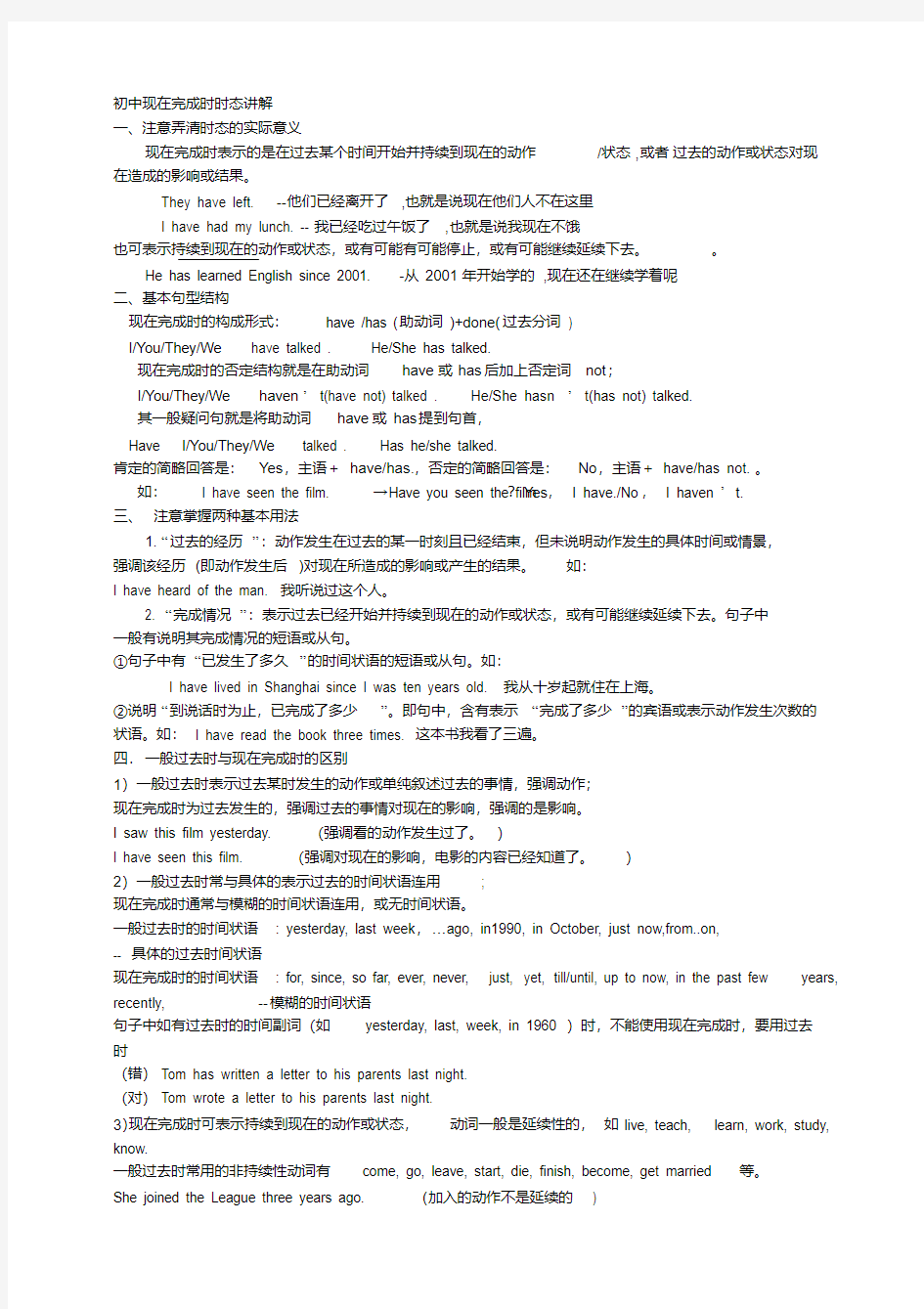初中_中考英语现在完成时时态仔细讲解与习题

- 1、下载文档前请自行甄别文档内容的完整性,平台不提供额外的编辑、内容补充、找答案等附加服务。
- 2、"仅部分预览"的文档,不可在线预览部分如存在完整性等问题,可反馈申请退款(可完整预览的文档不适用该条件!)。
- 3、如文档侵犯您的权益,请联系客服反馈,我们会尽快为您处理(人工客服工作时间:9:00-18:30)。
初中现在完成时时态讲解
一、注意弄清时态的实际意义
现在完成时表示的是在过去某个时间开始并持续到现在的动作/状态,或者过去的动作或状态对现
在造成的影响或结果。
They have left. --他们已经离开了,也就是说现在他们人不在这里
I have had my lunch. --我已经吃过午饭了,也就是说我现在不饿
也可表示持续到现在的动作或状态,或有可能有可能停止,或有可能继续延续下去。。
He has learned English since 2001. -从2001年开始学的,现在还在继续学着呢
二、基本句型结构
现在完成时的构成形式:have /has (助动词)+done(过去分词)
I/You/They/We have talked . He/She has talked.
现在完成时的否定结构就是在助动词have或has后加上否定词not;
I/You/They/We haven’t(have not) talked . He/She hasn’t(has not) talked.
其一般疑问句就是将助动词have或has提到句首,
Have I/You/They/We talked . Has he/she talked.
肯定的简略回答是:Yes,主语+have/has.,否定的简略回答是:No,主语+have/has not.。
?Yes,I have./No,I haven’t.
如:I have seen the film. →Have you seen the film
三、注意掌握两种基本用法
1.“过去的经历”:动作发生在过去的某一时刻且已经结束,但未说明动作发生的具体时间或情景,
强调该经历(即动作发生后)对现在所造成的影响或产生的结果。如:
I have heard of the man. 我听说过这个人。
2. “完成情况”:表示过去已经开始并持续到现在的动作或状态,或有可能继续延续下去。句子中
一般有说明其完成情况的短语或从句。
①句子中有“已发生了多久”的时间状语的短语或从句。如:
I have lived in Shanghai since I was ten years old. 我从十岁起就住在上海。
②说明“到说话时为止,已完成了多少”。即句中,含有表示“完成了多少”的宾语或表示动作发生次数的
状语。如:I have read the book three times. 这本书我看了三遍。
四.一般过去时与现在完成时的区别
1)一般过去时表示过去某时发生的动作或单纯叙述过去的事情,强调动作;
现在完成时为过去发生的,强调过去的事情对现在的影响,强调的是影响。
I saw this film yesterday.(强调看的动作发生过了。)
I have seen this film. (强调对现在的影响,电影的内容已经知道了。)
2)一般过去时常与具体的表示过去的时间状语连用;
现在完成时通常与模糊的时间状语连用,或无时间状语。
一般过去时的时间状语: yesterday, last week,…ago, in1990, in October, just now,from..on,
-- 具体的过去时间状语
现在完成时的时间状语: for, since, so far, ever, never, just, yet, till/until, up to now, in the past few years, recently, --模糊的时间状语
句子中如有过去时的时间副词(如yesterday, last, week, in 1960)时,不能使用现在完成时,要用过去
时
(错)Tom has written a letter to his parents last night.
(对)Tom wrote a letter to his parents last night.
3)现在完成时可表示持续到现在的动作或状态,动词一般是延续性的,如live, teach, learn, work, study, know.
一般过去时常用的非持续性动词有come, go, leave, start, die, finish, become, get married等。
She joined the League three years ago. (加入的动作不是延续的)
She has been in the League for three years (since three years ago). (在团内的状态可延续)
She has been a League member for three years (since three years ago).是团员的状态可持续)
五.比较延续动词与瞬间动词
延续动词表示经验、经历;
瞬间动词表示行为的结果,不能与表示一段时间的状语连用。
He has finished the work.他已完成了那项工作。(表结果)
I’ve known him since then.我从那时起就认识他了。(表经历)
注意延续性动词和短暂性动词的用法
1. 短暂性动词与短暂性时间(时间点)连用。如:
He joined the Party three years ago. 他入党三年了。(他三年前入党的)
句型。如:It is/has been three years since I bought the book. 这本书2. 用“It is/has bee n+时间段+since…”
我买了三年了。(从买这本书起到现在已三年了)
3. 用相应的延续性动词替换短暂性动词,句中谓语动词用现在完成时,时间状语为“for+时间段”或“since+时间点”。如:
He has been in the Greener China for three years.----
He has been a member of the Greener China fot three years.他加入“绿色中国”已经三年了。
The old man died 4 years ago. ----The old man has been dead for 4 years.
He joined the Party 2 years ago. -----He has been in the Party for 2 years.
I bought the book 5 days ago. ---- I have had the book for 5 days.
英语延续动词与非延续动词的转换
延续性动词表示能够延续的动作,如:learn, work, stand, lie, know, walk, keep, have, wait, watch, sing, read,sleep, live, stay等。延续性动词可以与表示时间段的状语连用。
表示时间段的短语有:
for+一段时间:for 2 years; since从句,since he came here;
since+时间点名词,since last year, since 5 days ago;how long; for a long time等。
非延续性动词也称终止性动词、瞬间动词,表示不能延续的动作,这种动作发生后立即结束。如:open, die, close, begin, finish, come, go, move, borrow, lend, buy等。
非延续性动词在肯定句中与表示时间点的状语连用,如:two years ago; at 5 o'clock;
例:He died 5 years ago.
延续性动词与非延续性动词之间的转换
leave --- be away borrow --- keep buy --- have
begin/start --- be on die --- be dead finish --- be over
open sth --- keep sth open fall ill --- be ill get up---be up
catch a cold --- have a cold come here --- be here go there --- be there
become --- be come back --- be back fall asleep --- be asleep
get to/ arrive/reach --- be (in) leave --- be away from get to know --- know
go (get) out →be out put on→ wear
比较since和for
since 用来说明动作起始时间—“自从……”
for用来说明动作延续时间长度—“长达……”
I have lived here for more than twenty years.
I have lived here since I was born.
My aunt has worked in a company since 1949.
I have not heard from my uncle for a long time.
注意:并非有for 作为时间状语的句子都用现在完成时
I worked here for more than twenty years. (我现在已不在这里工作。)
